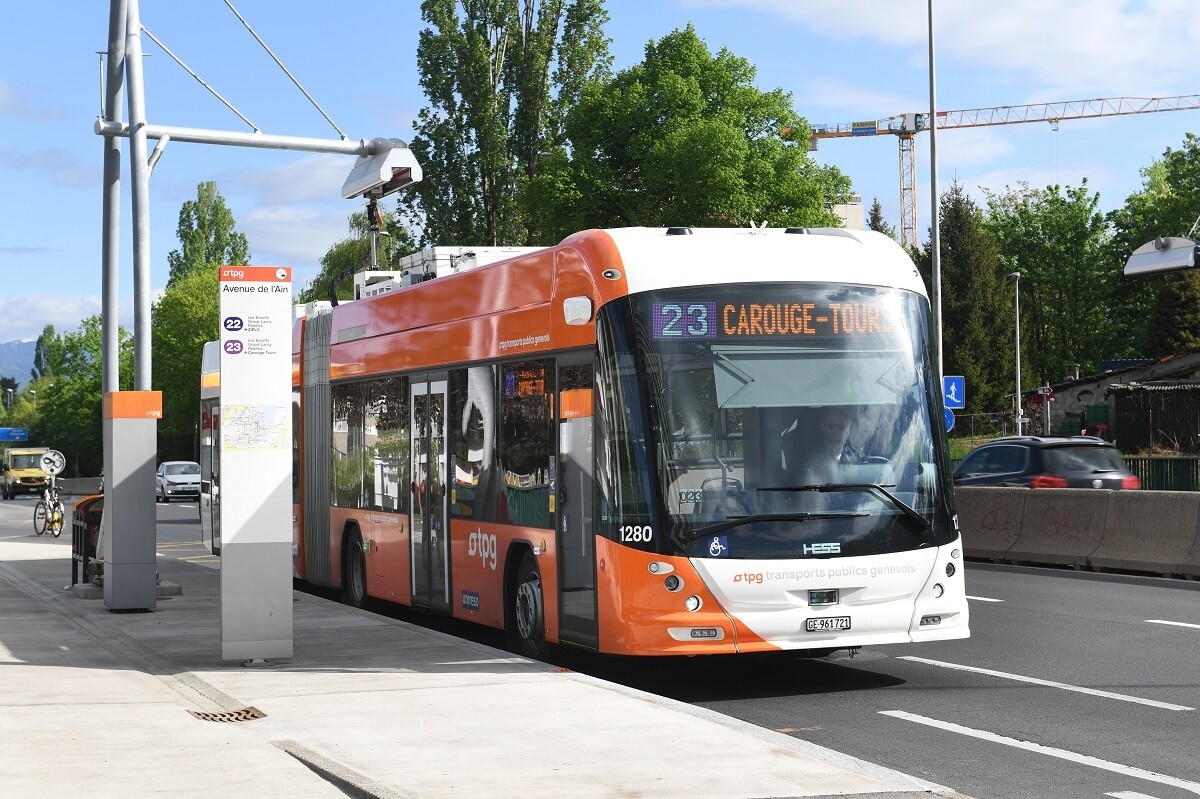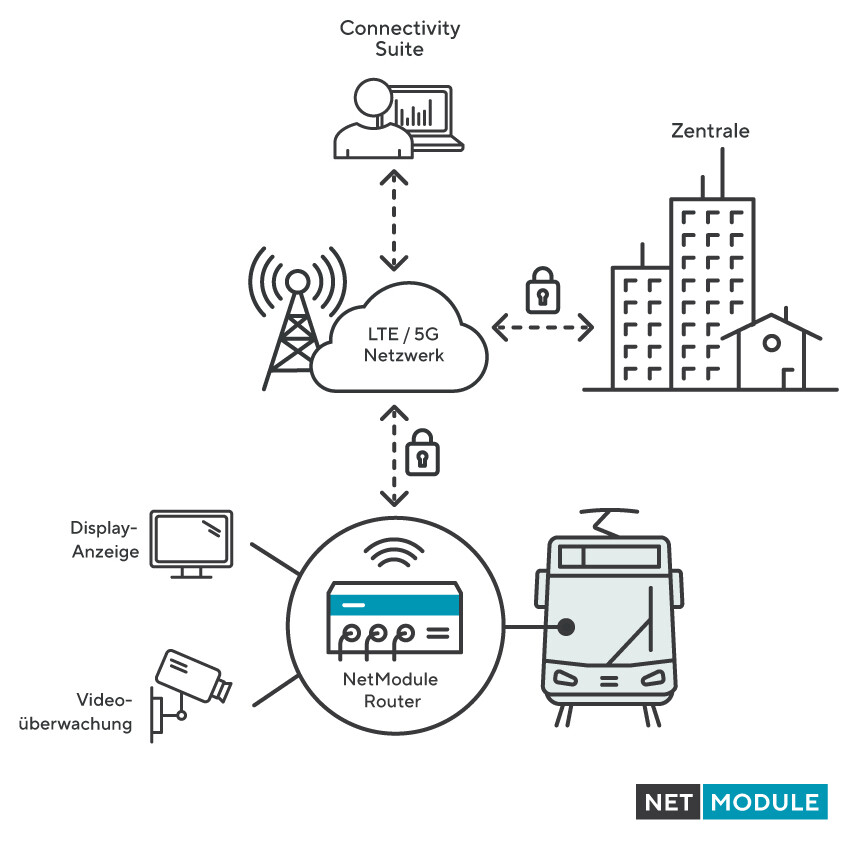Customer
The city of Geneva is primarily known for its concentration of banks, insurance companies and international organizations. But only very few people know that the metropolis also has one of the most modern transport companies in the world, Transport Public Genevois (tpg).
Transport Public Geneve (tpg), has chosen to embark on this journey, having received mobile routers for their buses, trams and stationary applications to propel their organization into the era of digitization. It operates in a dynamic environment, serving a large number of passengers. With an impressive annual (2022) ridership of 197 million, the public transportation system covers an extensive distance, tallying up to 388.3 million kilometers per annum. This vast network is facilitated by a diverse vehicle fleet comprising 480 units, including trams, buses, and electric buses and about 800 ticket machines. These figures underscore the scale and significance of tpg's operations, emphasizing the crucial role it plays in meeting the transportation needs of the community.
Challenge
For this project, specifications include the following:
- WiFi capabilities
- Universal deployable, high-performance mobile radio routers with railroad certification (EN50155) and memory or offline applications
- Passenger entertainment and information portal with offline content & real-time route information
- GNSS build inside for future advertisement applications
- Parallel use of up to four mobile connections

Discovery
To accommodate the difficulties brought-on by the unique requirements from tpg, NetModule emerges as the ideal solution provider for tpg's transformative project. With a proven track record in delivering universal deployable, high-performance mobile radio routers compliant with rigorous railroad standards, NetModule ensures the reliability and safety crucial for public transport operations. NetModule's expertise extends to the seamless integration of transmitting data via mobile or WiFi to the operator, an entertainment and information portal with offline capabilities and real-time route information. The inclusion of GNSS technology positions NetModule's solution as forward-thinking, paving the way for potential future applications in location-based services and advertisements.
Solution
Facing the challenges of modernizing their infrastructure and meeting the demands of a tech-savvy passenger base, tpg sought a partner capable of delivering universal, high-performance solutions. The primary objectives included establishing reliable onboard networks, enhancing passenger services, and ensuring seamless connectivity across their fleet of vehicles.
NetModule's NB3800 mobile router has been successfully integrated into the fleet of buses and trams by tpg. This router surpasses expectations with features such as railroad certification (EN50155) for safety standards in railway environments, substantial memory capacity for offline applications in areas with limited network coverage, and the ability to parallelly use up to four mobile connections for optimized data speeds and enhanced redundancy.
For stationary applications like ticket machines and information kiosks, tpg implemented NetModule's NB800. This versatile solution offers scalability and reliability, crucial for continuous performance in various static environments. The NB800's compact and durable design makes it suitable for diverse installations, ensuring longevity even in challenging conditions.
Additionally, tpg utilizes the Connectivity Suite for remote maintenance of routers, enabling global management with ease. This suite allows swift updates and changes, incorporates advanced encryption for scalable network security, and ensures constant control over data security through on-premise installation.
The integration of NetModule's NB3800 and NB800 has brought about transformative outcomes for tpg:
- Enhanced Passenger Experience: Seamless data exchange minimizes downtime, improves service reliability, optimizes route planning, and enables faster issue resolution, contributing to a punctual and reliable public transportation service for passengers and results in greater customer satisfaction.
- Operational Efficiency: The robust and reliable nature of NetModule's solutions has translated into increased operational efficiency, ensuring that tpg's transportation services run smoothly and without disruptions.
- Future-Ready Infrastructure: NetModule's forward-thinking approach, with features like GNSS technology in the NB3800, positions tpg's infrastructure as adaptable and ready for future technological advancements, including potential applications in location-based services.
- Time and Cost Savings: The elimination of staff manually exchanging data on vehicles using laptops and network cables translates into significant time and cost savings. This newfound efficiency allows resources to be utilized more effectively.
In addition, for several years now, tpg has been committed to applying the standards and best practices emanating from ITxPT (Information Technology for Public Transport) in the field of interoperable IT solutions (hardware and software) to equip its fleet of vehicles. The mission of the ITxPT Association is to enable interoperability between IT systems in Public Transport by offering public specification of an IT architecture based on standards with open interfaces for on-board, over-the-air and back-office IT systems. In essence, tpg's network is a well-integrated and secure ecosystem that not only supports day-to-day operations but also positions the organization for continued technological growth.

Result
Gone are the days of manual data retrieval which was limited to experts within the boundaries of the depot. Tpg now boasts continuous data exchange between vehicles and the headquarters, breaking free from the traditional constraints. This not only ensures real-time updates but also enhances the security and availability of vehicles, a significant departure from the previous manual reading process restricted to the depot.
Flexibility, which is essential for adapting to new service offerings, has been a challenge in the past, especially when wired data limited the speed of operations. NetModule stepped in as the game-changer, enabling data transmission via VPN connections and over the air from the headquarters directly into buses and tramways. No longer bound by wires, tpg can swiftly adapt to changes, like using a bus on a new route without being bogged down by inaccuracies in stop information.
The introduction of the 5G Railway router is a milestone for tpg. It automates the distribution of data across its Ethernet-based IP network to various services, irrespective of their communication protocols. The days of staff manually exchanging data on vehicles using laptops and network cables are behind us. This not only brings flexibility but also translates to significant time and cost savings.
In terms of security, tpg has set high standards, with each service operating on a dedicated IT system running on separate servers distributed across various locations. This setup reduces the risk of a total outage in the event of a cyber-attack or fire, allowing for at least limited continued operation.
Additional security measures, including dedicated monitoring systems for the route between servers, mobile network operators, and routers, enhance availability. Regular functional tests are conducted using the "Connectivity-Suite" management software, seamlessly managed and administered without additional effort for the tpg operator.
The mobile router is not only value for its security features but also for its Wi-Fi interface, saving costs for tpg. As vehicles enter the depot, they automatically switch to Wi-Fi communication, eliminating data transfer fees typically associated with SIM cards.
In essence, the collaboration between tpg and NetModule has ushered in a new era of connectivity, flexibility, and efficiency in public transportation, showcasing the power of innovative solutions in meeting the evolving needs of the industry.
